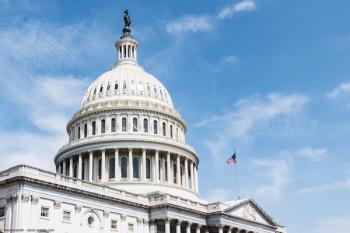
Merger mania requires protections for patients, providers
"To preserve a degree of competition within the industry, lawmakers and regulators have taken tentative steps to defend independent practice and patient-centered care, as well as ensure employed providers maintain fundamental rights," writes the AACU's Ross E. Weber.
Based on a partnership with Urology Times, articles from the American Association of Clinical Urologists (AACU) provide updates on legislative processes and issues affecting urologists. We welcome your comments and suggestions. Contact the AACU government affairs office at 847-517-1050 or
A
To preserve a degree of competition within the industry, lawmakers and regulators have taken tentative steps to defend independent practice and patient-centered care, as well as ensure employed providers maintain fundamental rights.
On Nov. 28, 2018, CVS Health announced that the company officially completed its acquisition of Aetna, having received preliminary approval from the Department of Justice (DOJ) in October. The deal between one of the country's largest pharmacy benefit managers and insurers took more than a year and was also approved by every state, despite being opposed by physician groups and members of Congress.
The U.S. House Judiciary Committee held a hearing on the merger earlier this year, during which Rep. Jerrold Nadler (D-NY) warned, "The health-care sector is already highly concentrated, and there remains a concern that dominant firms-including a post-merger CVS-Aetna-would have the ability and the incentive to exclude competitors or to diminish competition."
Also from the AACU:
On the other side of the Capitol, the likely incoming chair of the influential Senate Finance Committee, Sen. Chuck Grassley (R-IA), had called for the DOJ to scrutinize mergers such as those between CVS-Aetna and Cigna-Express Scripts, citing anticompetitive concerns. More recently, he urged the Federal Trade Commission (FTC) to examine "potentially anticompetitive contracting practices between insurers and hospital systems" that could be driving up costs for consumers.
In a letter to FTC Chairman Joseph Simons, Sen. Grassley noted that health care spending "is projected to grow at an average rate of 5.5% per year and reach $5.7 trillion by 2026. The last thing American patients and consumers need at this time," according to Grassley, "is a health care system that permits or encourages anti-competitive agreements that hinder access to lower cost care."
Five days after the CVS-Aetna announcement, three members of President Trump's cabinet published an action plan to counter consolidation and increase competition. The report,
Of some concern to physicians are several work force recommendations. First, the report suggests that states relax scope-of-practice laws to boost competition among "clinicians," seemingly ignoring the fact that physicians and non-physician providers exist in two different, incomparable worlds when it comes to training and experience. According to MedPage Today, the report also recommends:
- The federal government and states should consider accompanying legislative and administrative proposals to allow non-physician providers to be paid directly for their services where evidence supports that the provider can safely and effectively provide that care.
- States should consider eliminating requirements for rigid collaborative practice and supervision agreements between physicians and their care extenders that are not justified by legitimate health and safety concerns.
The report also reintroduces a plan that originated in the president's 2019 budget proposal that called for streamlining all spending on graduate medical education into a single grant program, "funded out of the Treasury and jointly operated by the administrators of [the Centers for Medicare & Medicaid Services] and [the Health Resources and Services Administration]." At the time, AACU President Patrick McKenna, MD, warned that this change would be "catastrophic."
The authors identified "a variety of anti-competitive restrictions at the state level," and in a press call following publication of the report, a senior administration official suggested that "CON represents one of the worst." The report recommends that states repeal their CON laws "or, at a minimum, significantly scale back the scope of their CON regimes, for example, by ensuring that competitors of CON applicants cannot weigh in on these applications."
Physicians' employment agreements have raised antitrust concerns throughout the United States. The highest profile recent challenge popped up in April 2018 when a physician group in North Carolina sued a health system in state court, accusing it of monopolization by including overly restrictive covenants in employment agreements. According to the Legal Intelligencer, at the end of 2017, legislators in Pennsylvania proposed legislation to ban non-compete agreements. That proposal was consistent with a trend in other states.
Read:
In New Jersey, the Senate proposed a bill that would place limits on the ability to impose non-competes. A year before, two states in New England enacted laws restricting the use of non-compete clauses. Rhode Island's comprehensive statute invalidates "any restriction of the right of [a] physician to practice medicine" that may be contained in an employment agreement. The Connecticut law, meanwhile, only limits the allowable duration (to one year) and geographical scope (up to 15 miles) of any new, amended, or renewed physician agreement. (See:
For urologists employed by a health care system, you may be well served to know about
Indeed, the AACU stands ready to assist in these efforts. Executive office staff will work with members to draft legislation, identify a sponsor to introduce the bill, and collaborate with the state medical society to promote the proposal. As for influencing conversations in Washington, the AACU works closely with UROPAC – Urology's Advocate on Capitol Hillto facilitate introductions and educate candidates and their campaigns about the issues impacting urologists and the urologic community.
Newsletter
Stay current with the latest urology news and practice-changing insights — sign up now for the essential updates every urologist needs.






